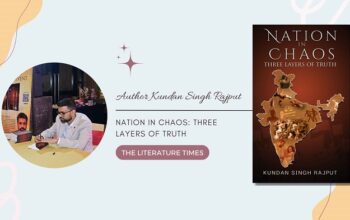In Love, Friendship & Them, Zahid Imam invites readers into a world where emotions whisper louder than words and memories lingers long after moments pass. With prose that feels both intimate and universal, Zahid writes for the hearts that have known love, loss, and everything in between. Today, we sit down with Zahid Imam to explore the mind behind the words—the quiet thoughts, the inspiration, and the stories that shaped this poignant collection.
The Literature Times: What inspired you to write Love, Friendship & Them? Was there a particular moment or experience that sparked it?
Zahid Imam: This book “Love, Friendship & Them”, was born out of small passing moments that stays with you even after they’ve passed.It wasn’t one single event but a collection of emotions that I have experienced and carried for years, like the warmth of first love, the ache of fading friendship, and the weight of the words that were left unsaid. Writing became my way of preserving them, like pressing flowers between pages so they don’t get lost.
The Literature Times: Your writing captures emotion with such subtlety. How do you approach translating complex feelings into words?
Zahid Imam: I try to listen more than I write. Every emotion carries its own rhythm, and my task as a writer is to capture it without forcing it. Sometimes it’s a single image, other times it’s silence itself that does the talking. I think subtlety comes when you allow readers to fill the spaces with their own feelings.
The Literature Times: The book touches on themes like first love, fading friendships, and unsaid goodbyes. Are any of the pieces drawn from personal experience?
Zahid Imam: Yes – maybe not in a literal sense but it is purely written from my personal experience.
The Literature Times: You describe your work as a companion for the nostalgic and the hopeful. Who did you imagine you were writing this book for?
Zahid Imam: There are many who I thought of while writing this book. There are some direct and indirect dedications hidden in these lines, especially those who I have loved and lost. But I also have imagined anyone who has ever paused in the middle of a past memory and smiled or maybe teared up. Anyone who still replays conversation in their heads, and those who never said what they wanted to. In short, those who have loved and lost, but still believes in the beauty of both.
The Literature Times: How do you navigate the balance between vulnerability and privacy in your writing?
Zahid Imam: At first it was very difficult for me, sometimes it was too vulnerable and sometimes my privacy got exposed. Then I figured it’s like leaving a window open but keeping the curtains drawn. I shared enough for readers to feel the heartbeat, but I didn’t reveal too much of it. Vulnerability is essential to connect, but privacy helps me sustain myself as a writer.
The Literature Times: Which piece or section in the book holds the most personal meaning for you, and why?
Zahid Imam: The book as a whole is very personal to me. But if I were to select one piece, it would be “Unheard Whispers”. This holds the most personal meaning for me. It was the first poetry I wrote for someone I once knew, but after they were gone. Writing it was my way of giving shape to the silence which was left behind. The piece carries the weight of everything unspoken, and for me, it marks the true beginning of my journey as a writer.
There’s a line from it,
“I never wrote a poetry for you,
Yet’ in every line, your absence grew”
It reminds me that sometimes what we don’t say becomes louder than the words we do.
The Literature Times: Many of your themes are deeply relatable yet often left unspoken. Why do you think people are afraid to talk about these quiet emotions?
Zahid Imam: I believe people are afraid. Afraid that people will laugh at them. Quiet emotions demand honesty, and honesty makes us vulnerable. It’s when people start making joke of you. It’s when they start taking advantage of you. It is easier to laugh about heartbreak than to admit you still miss someone you knew from ten years ago. But I believe people secretly long for those conversations – that’s why they turn to books like mine.
The Literature Times: As a writer, what does your creative process look like? Do you write daily or only when inspiration strikes?
Zahid Imam: Honestly,I don’t write every day. For me, writing is like catching rain – I have to be ready with an open hand when it falls. Sometimes inspiration comes at midnight, sometimes while I’m driving. What matters is staying attentive to life; the words follow naturally.
The Literature Times: If readers could take away just one feeling or message from Love, Friendship & Them, what would you want it to be?
Zahid Imam: That it’s okay to feel deeply, even when the world tells you to move on. Love, loss and friendship are not weaknesses – they are what makes us human. If my book can remind someone that their quiet emotions are valid, then I have done my job.
The Literature Times: What’s next for you as a writer? Are there any upcoming projects or themes you’re excited to explore?
Zahid Imam: I would love to write more, I have so much unsaid words left, so much ideas that I want to try out. I was already working on a romance novel but due to my sudden heart complications my progress is slowed by a lot. But I’m trying my best to seeing it through and trying to write as much as possible. I really want my words to reach people but I don’t know if it would be possible. I want to move beyond just love and friendship, and explore deeper themes like silence, memory, and the ways we carry our past into the present. I’m especially drawn to those quiet emotions we rarely put into words, and I hope to give them a space in my next work.



